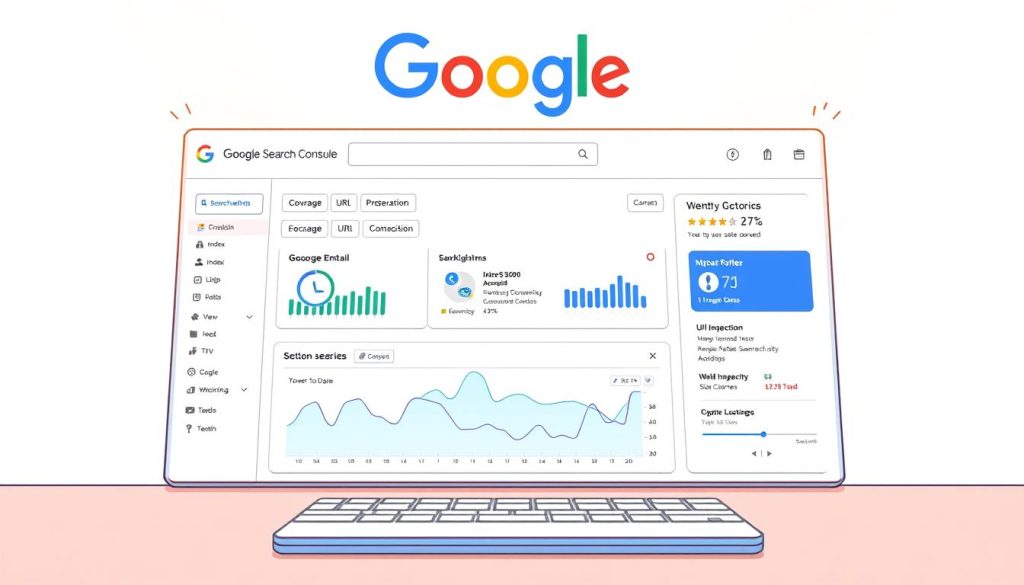Starting out in Search Engine Optimization (SEO) can feel like a big challenge. There are so many SEO strategies to try, it’s tough to know where to begin. To boost your website’s ranking, you need to know the best SEO methods.
But don’t worry, there are many SEO tools and techniques for beginners. Using these can help make your website more visible. This can bring more people to your site.
Table of Contents
Main Objectives
- Understand the basics of SEO and its importance for beginners
- Discover the top 4 SEO tools for improving website ranking
- Learn effective SEO techniques for beginners
- Improve your website’s visibility with the right SEO strategies
- Drive more traffic to your site with beginner-friendly SEO methods
The Current State of SEO in 2025
SEO in 2025 is all about technology and how we use it. Search engines keep getting smarter. So, we need to change how we do SEO too.
AI has changed SEO a lot. Now, search engines look for content that’s not just right. It must also fit the context and be easy for users to use.
Key Algorithm Changes Affecting Rankings
Recent updates have made user experience and content quality more important. Here are the main changes:
- Page speed and mobile friendliness matter more now
- Content must be relevant and understood in context
- How users interact with your site is now more important
| Algorithm Change | Impact on Rankings | SEO Strategy |
|---|---|---|
| Page Speed Importance | Faster pages rank higher | Optimize images and minify code |
| Content Relevance | More relevant content ranks higher | Use contextual keywords naturally |
| User Engagement | Higher engagement metrics improve rankings | Enhance user experience and content quality |
Why Beginners Need to Master SEO Now
For beginners, learning SEO is key in 2025. With more competition online, knowing SEO can really help. By understanding SEO basics, beginners can make content that search engines and users love.
Key benefits for beginners include: better visibility online, a solid content plan, and a competitive edge.
Why the Right SEO Strategy Matters for New Websites
Getting the right SEO strategy is key for new websites to be seen online. A good SEO plan helps them rank better in search results. This brings more people to their site.
The Competitive Advantage of Early SEO Implementation
Starting with SEO early gives a competitive advantage. It sets a strong base for the website’s online presence. By optimizing early, new sites can get better rankings and more visitors.
This forward thinking lets them lead their competitors. They can also catch up with new trends.
Common SEO Mistakes Beginners Make
Beginners often make big SEO mistakes. These mistakes can hurt their site’s performance. Common errors include keyword stuffing, not making sites mobile-friendly, and ignoring technical SEO.
Knowing these mistakes helps new sites avoid them. This makes their SEO strategy work better.
Some key mistakes to avoid include:
- Overusing keywords
- Neglecting mobile-friendliness
- Ignoring page speed optimization
By understanding these common mistakes, new websites can make a better SEO plan.
Essential SEO Tools and Techniques for Beginners
For beginners, getting into SEO can seem tough. But knowing the right tools and strategies can really help. It can make your website more visible and improve its ranking.
Understanding the SEO Toolkit Fundamentals
The SEO toolkit has many tools for keyword research, on-page optimization, and tracking performance. Some key tools are:
- Keyword research tools like Google Keyword Planner and SEMrush
- On-page optimization tools such as Rank Math for WordPress
- Performance tracking tools like Google Analytics 4
These tools help beginners see what’s working and what’s not. They make it easier to make smart choices based on data.
Free vs. Paid SEO Solutions: What’s Worth It
Beginners often debate whether to use free or paid SEO tools. Free tools are a good start, but paid tools have more features and support.
Key benefits of paid SEO tools:
- Advanced features for deeper analysis
- Regular updates and support
- Integration with other marketing tools
Choosing between free and paid SEO tools depends on your needs and budget.
Top SEO Tool #1: Google Search Console
Google Search Console is a key tool for SEO beginners. It gives insights straight from Google.
Step-by-Step Setup Process
Setting up Google Search Console is easy. First, you must verify your website.
Verifying Website Ownership
To verify, follow these steps: 1. Sign in to your Google Search Console account. 2. Add your property (website URL). 3. Choose a verification method (HTML file upload, meta tag, or DNS record). 4. Finish the verification as your method suggests.
Submitting Your Sitemap
After verifying, submit your sitemap. This helps Google understand your site’s layout.
Essential Features for Beginners
Google Search Console has key features for beginners.
Performance Monitoring Tutorial
Watch your website’s performance. See search queries, impressions, and click-through rates.
Fixing Indexing Issues
Find and fix indexing problems. This ensures your pages are crawled and indexed by Google.
| Feature | Description | Benefit |
|---|---|---|
| Performance Monitoring | Tracks search queries, impressions, CTR | Understand your site’s visibility |
| Indexing Issues | Identifies crawling and indexing problems | Fix errors to improve indexing |
| Sitemap Submission | Helps Google understand your site’s structure | Improves crawling and indexing |

Top SEO Tool #2: SEMrush for Complete Keyword Research
Keyword research is key for SEO success. SEMrush is a top tool for this. It offers many features for keyword research, competitor analysis, and site audits.
Getting Started with SEMrush
To start with SEMrush, first set up your account. Then, create your first project. You’ll need to enter your website’s URL and choose your project type.
Setting Up Your First Project
Setting up your first project is easy. Go to the ‘Projects’ tab, click ‘Create a Project,’ and follow the steps. You’ll need to enter your website’s details.
Navigating the Dashboard
After setting up your project, you’ll see the dashboard. Here, you can use tools like keyword research, competitor analysis, and site audits.
Finding Low-Competition Keywords Step-by-Step
SEMrush helps you find low-competition keywords. You can look at search volume, competition level, and more. Here’s how:
- Use the Keyword Magic Tool to find relevant keywords.
- Filter results by competition level and search volume.
- Look at the keyword difficulty score to find low-competition keywords.
Competitor Analysis Techniques
SEMrush also has great tools for competitor analysis. You can see your competitors’ keyword strategies. Find gaps in their content and adjust your plan.
| Competitor Analysis Feature | Description | Benefit |
|---|---|---|
| Keyword Gap Analysis | Find keywords your competitors rank for but you don’t. | Boost your keyword strategy. |
| Competitor Keyword Research | Look at the keywords your competitors rank for. | Learn about their strategies. |
Top SEO Tool #3: Rank Math for WordPress Optimization
Rank Math is a top SEO plugin for WordPress. It offers many tools to help improve your site’s search rankings. This means more people can find your site.
Installation and Configuration Guide
Installing Rank Math is easy. Just search for “Rank Math” in WordPress, install, and activate it. The setup wizard will help you get started.
Content Optimization Walkthrough
Rank Math has many features to optimize your content. This includes:
- Title and Meta Description Optimization: Make titles and meta descriptions that get more clicks.
- Content Analysis Features: Get detailed analysis and tips to boost your content’s SEO.
Title and Meta Description Optimization
Rank Math helps you optimize your titles and meta descriptions. It gives advice on length and keyword use.
Content Analysis Features
The content analysis feature shows your content’s SEO strengths and weaknesses. It helps you know what to improve.
Schema Markup Implementation
Rank Math makes adding schema markup easy. This can make your site more visible in search results.

By using Rank Math’s features, you can greatly improve your WordPress site’s SEO.
Top SEO Tool #4: Google Analytics 4 for SEO Performance Tracking
In 2025, Google Analytics4 is a top choice for tracking SEO performance. It’s key to understand how users act on your site and track your SEO success. Google Analytics4 helps you achieve these goals.
Setting Up GA4 with SEO Goals
To use Google Analytics4 well, set it up with clear SEO goals. You need to define important KPIs that match your SEO plan. Proper setup gives you accurate tracking and useful insights.
Key SEO Metrics to Monitor Weekly
Watching the right SEO metrics weekly can boost your SEO plan. Important ones are organic traffic, bounce rates, and conversion rates. Regular checks help you make smart choices.
Traffic Source Analysis
Knowing where your traffic comes from is key. Google Analytics4 gives deep insights into traffic sources. This helps you see which channels work best for your SEO.
User Behavior Insights
Looking at how users act on your site can show important patterns. Metrics like average session duration and pages per session show how engaged users are.
Creating Custom SEO Dashboards
Custom dashboards in Google Analytics4 let you focus on key SEO metrics. By making dashboards tailored to your needs, you can quickly see how your SEO is doing. This helps you make choices based on data.
Conclusion: Implementing Your 2025 SEO Strategy
As we enter 2025, having a good SEO plan is key for online success. Beginners can achieve real results by using the right SEO tools and methods. This helps build a strong online presence.
To implement an SEO strategy well, you need to know the basics of SEO. Use tools like Google Search Console, SEMrush, Rank Math, and Google Analytics 4. Always keep an eye on your progress and make changes as needed.
If you’re new to SEO, start with simple techniques and improve your strategy over time. Focus on the best SEO tools and methods. This will make your website more visible, bring in more visitors, and help you reach your online goals.



